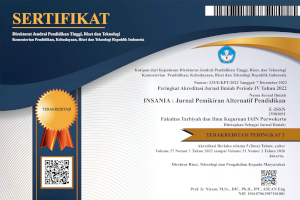INTEGRASI PEMIKIRAN IMAM AL-GHAZALI & IVAN PAVLOV DALAM MEMBENTUK PRILAKU PESERTA DIDIK
DOI:
https://doi.org/10.24090/insania.v25i1.3651Keywords:
Habituation, riyadhoh, classical conditioning, behaviourAbstract
ABSTRAK This study aims to analyze the relationship between the thoughs of al-Ghazali and Ivan Pavlov in establishing educational behaviours. In this study took two figures: The first Imam Al-Ghazali, which is one of the Sufi figures using the riyadhoh concept and dubbed it the hujjatul Islam and secondly Ivan Patrovich Pavlov which is one of the behavioristik learning theory using the clasical conditioning concept dubbed the father behavioristic theory. This type of research is are search library based on the books of the two figures. The approach philosophical-historical and content analysis are a reference in providing an explanation of the results of the data found. The results of this study indicate that by taking the road to habituation will be able to provide a change in one is behavior. Refraction is done in three stages, namely takhalli (unconditioning stimulus), tahalli (conditioning stimulus), and tajalli (conditioning response) in order to reflect the good behavior become a habitual hai'ah in self learners.Downloads
References
Adisusilo, S. (2013). Pembelajaran Nilai-karakter Konstruktivisme dan VCT Sebagai Pendekatan Pembelajaran Afektif. Jakarta: Raja Grafindo Persada.
Ahmad, M. (2011). Agama danPsikoanalisa Sigmund Freud. Religia Jurnal Ilmu-ilmu. Keislaman. 14(2), 277-296. doi: https://doi.org/10.28918/religia.v14i2.92
Al-Ghazali, I.M. 1995. Khuluqul Muslim, Terj. Bandung: Al-Ma’arif.
——— (1998). al-Munqidz min Adh-Dhala, Terj. Bandung: Pustaka Hidayah
——— (2008). Mukhtasyar Ihya' 'Ulumuddin, Terj. Yogyakarta: Absolut.
——— (2011). Ihya’ ’Ulumiddin, Terj. Jakarta: Republika Penerbit
——— (2014). Metode menaklukkan jiwa: pengendalian nafsu dalam perspektif sufistik, Terj. Bandung: MizanPustaka.
Amin, M. S. (2016). Ilmu Akhlak. Jakarta: Amzah.
Nasution, B. A. & Siregar, H. R. (2007). Akhlak Tasawuf. Depok: Raja Grafindo Persada.
Custers, Ruud &Aarts, A. (2010). The Unconscious Will: How the Pursuit of Goals Operates Outside of Conscious Awareness. Science. 329 (5987), 47-50. DOI: 10.1126/science.1188595
Familus. (2016). Teori Belajar Aliran Behavioristik Serta Implikasinya dalam Pembelajaran Improvisasi Jazz. Jurnal PPKn & Hukum. https://doi.org/10.1007/s00267-011-9698-0
Herdiansyah, H. (2015). Metodologi Penelitian Kualitatif Untuk Ilmu Psikologi. Jakarta: Salemba Humanika.
Kasiram, H. M. (2010). Metodologi Penelitia. Malang: UIN-Maliki Press.
Mz, R. S. (2018). AKHLAK ISLAMI PERSPEKTIF ULAMA SALAF. Edukasi Islami : Jurnal Pendidikan Islam. https://doi.org/10.30868/ei.v7i01.212
Muin, F. (2011). Pendidikan Karakter Konstruksi Teori & Praktek. Jakarta: Ar-Ruzz Media.
LN, Y. S., & Juntika, A. N. (2007). Teori Kepribadian. Bandung: Remaja Rosdakarya.
Nahar, I. N. (2016). Penerapan teori belajar behavioristik dalam proses pembelajaran. Jurnal Ilmu Pengetahuan Sosial. https://doi.org/10.1111/j.1365-2141.1992.tb08137.x
Purwanto, N. M. (2014). Psikologi Pendidikan. Bandung: Remaja Rosdakarya.
Rohmah, Noer. (2012). Psikologi Pendidikan. Yogyakarta: Penerbit Teras.
Sugihartono, Agus. F. S, Rohmah. S. N., & Kartika. N. (2013). Psikologi Pendidikan. Yogyakarta: UNY Press
Syah, M. (2003). Psikologi Belajar. Jakarta: Raja Grafindo Persada
Zahruddin, & Hasanuddin. (2004). Pengantar Studi Akhlak. Jakarta: Raja Grafindo Persada.
Zulfahmi, S., & Hasmah, W. M. (2014). Perbandingan Pemikiran Konsep Akhlak Al-Ghazali Dan Ibn Miskawayh Dalam Aspek Intelek. The Online Journal of Islamic Education, 2, (2), 107-119.
Zulhammi. (2015). Teori belajar behavioristik dan humanistik dalam perspektif pendidikan Islam. Jurnal Darul Ilmi. 3(1). 105-127.
Zulkifli.( 2018). Akhlak Tasawuf Jalan Lurus Mensucikan Diri. Yogyakarta: Kalimedia.
Downloads
Published
How to Cite
Issue
Section
License
Authors who publish with this journal agree to the following terms:
Authors retain copyright and grant the journal right of first publication with the work simultaneously licensed under a Creative CommonsAttribution-ShareAlike License that allows others to share the work with an acknowledgment of the work's authorship and initial publication in this journal.
Authors are able to enter into separate, additional contractual arrangements for the non-exclusive distribution of the journal's published version of the work (e.g., post it to an institutional repository or publish it in a book), with an acknowledgment of its initial publication in this journal.
Authors are permitted and encouraged to post their work online (e.g., in institutional repositories or on their website) prior to and during the submission process, as it can lead to productive exchanges, as well as earlier and greater citation of published work (See The Effect of Open Access).








